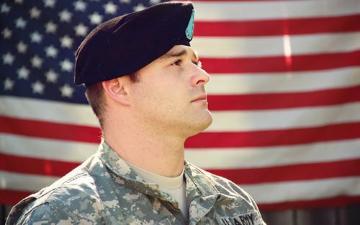
Sharefaith/Pexels
John Pelissero (@1pel) is a political scientist and senior scholar for government ethics at the Markkula Center for Applied Ethics at Santa Clara University. He served on active duty as a U.S. Army captain in the 1980s.
Many military personnel and their family members are declining to receive the COVID-19 vaccine. At this time, the Department of Defense leaders have not ordered all personnel to take the vaccine. This situation raises important ethical issues for our national security and the public health of communities.
The U.S. military includes over 1.3 million active-duty personnel in the Army, Navy, Marines, and Air Force. And military service members have families (“dependents”), estimated to number over 1.6 million. These individuals live and work on military bases and close-quarters ships, and many reside in local communities adjacent to military installations. Although vaccine rates vary by branch of service, overall about one-third of the military has refused to get a COVID-19 vaccine.
As of March 1, 2021, Defense Department data show that over 250,000 of its employees and their dependents have tested positive for COVID-19, including over 25,000 members of the National Guard. The coronavirus has affected a large number of service members and has been linked to the spread of virus infections in the adjacent cities and towns that the military frequent.
Many young service members are relying on misinformation and social media sources to learn about the vaccines. About 80% of enlisted service have only a high school education. Often, they lack understanding about where to find accurate data on issues, including the efficacy and public health benefits of receiving a COVID-19 vaccine.
Defense officials have not ordered military members to receive a vaccine, citing the fact that the coronavirus vaccine is approved on an emergency basis. This determination is what allows service members to decline the vaccine. Members of the armed services have few opportunities for free choice and because they can say no to something, they are choosing to do so on getting a shot. Many seem to think that by having a choice, they should say no to the vaccine, exercising their limited independence from the norms of following military orders. Alternatively, they and their family members have the opportunity to choose to receive the vaccine. In doing so, they would show an ethical awareness of what will serve the public interest and personal health.
Defense Department leaders—both civilian and military—must directly confront the threat that a high declination rate for the vaccine presents a risk to national security and community health. There are two ethical steps that would mitigate the potential harm to military preparedness and to community health. One is providing vaccine education and the second is expanding awareness of the risks to individuals and the community when large numbers of individuals decline the vaccine.
Military leaders must engage in a broad and focused education campaign about the safety and efficacy of the COVID-19 vaccines. In addition to official programs targeted to military, leadership can use the social media platforms and websites that are commonly viewed by service members—especially enlisted personnel and their family members. By pushing out accurate vaccine data to the outlets used by service members, the military leaders can create a more informed military that arms services members with the best data to make their individual choices about the vaccine.
Leaders should create conditions under which broad ethical awareness can evolve among service members and their families. Basic information about the risk and harm to individuals who contract the coronavirus should be shared widely. Moreover, service members need to be alerted to the perils to national security if large numbers of a military team are incapable of fulfilling a critical mission because of infections within the unit. And finally, leadership should promote the value that service members and their family members have an ethical obligation to care for the communities in which they reside and socialize. Raising awareness of the ethical obligation to reduce harm and contribute to good public health will be important.
Eventually, like so many other aspects of military life, its leaders will order personnel to be vaccinated. Until that happens, these leaders should immediately engage in vaccine educational programs and raise ethical awareness among service members and their families. Doing so demonstrates ethical awareness of the implications of vaccinations for our nation’s military readiness and the public health of military communities.
